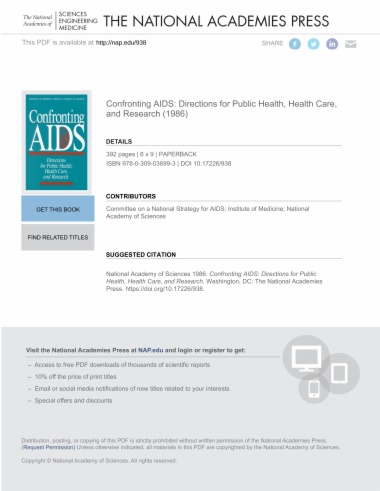This volume examines the complex medical, social, ethical, financial, and scientific problems arising from the AIDS epidemic and offers dozens of public policy and research recommendations for an appropriate national response to this dread disease.
- Cover
- Front Matter
- Abstract
- 1. Confronting AIDS: Summary and Recommendations
- 2. Understanding of the Disease and Dimensions of the Epidemic
- 3. The Future Course of the Epidemic and Available National Resources
- 4. Opportunities for Altering the Course of the Epidemic
- 5. Care of Persons Infected with HIV
- 6. Future Research Needs
- 7. International Aspects of AIDS and HIV Infection
- Appendix A. Clinical Manifestations of HIV Infection
- Appendix B. Serologic and Virologic Testing
- Appendix C. Risk of HIV Transmission from Blood Transfusion
- Appendix D. U.S. Public and Private Sector Resources for Fighting AIDS
- Appendix E. The Centers for Disease Control
- Appendix F. CDC Classification System for HIV Infections
- Appendix G. PHS Plan for Prevention and Control of AIDS and the AIDS Virus
- Appendix H. List of Background Papers
- Appendix I. List of Presentations at Public Meetings
- Appendix J. Acknowledgments
- Appendix K. Biographical Notes on Committee Members
- Glossary
- Index

